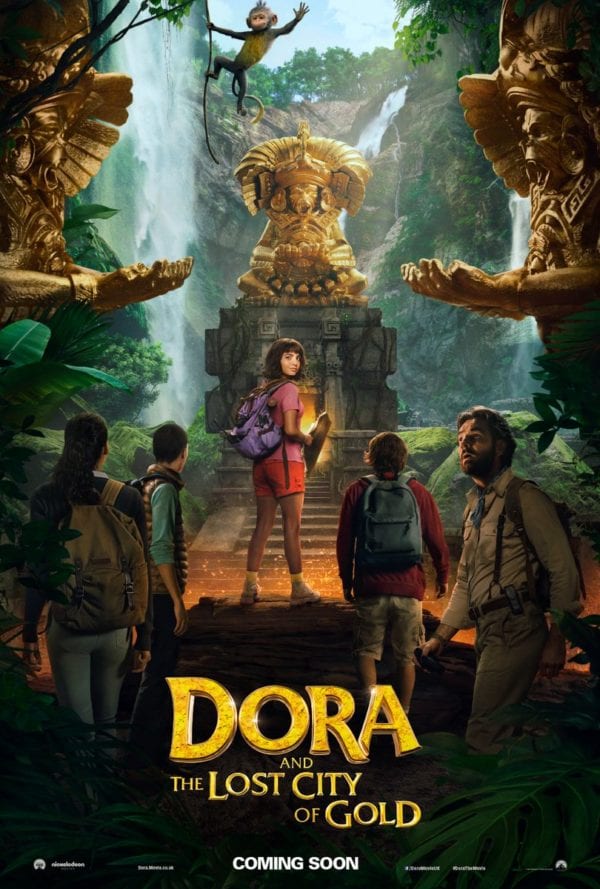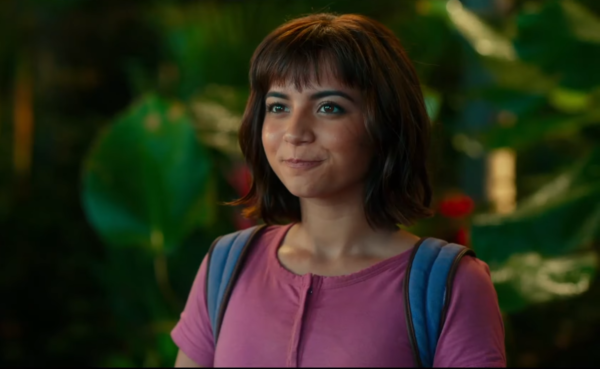Dora and the Lost City of Gold, 2019.
Directed by James Bobin.
Starring Isabela Moner, Jeff Wahlberg, Michael Peña, Eva Longoria, Eugenio Derbez, Madeleine Madden, Nicholas Coombe, Benicio del Toro and Danny Trejo.
SYNOPSIS:
After growing up in the jungle with her explorer parents, Dora must take on being a high school student, at least until she’s kidnapped and dumped straight back into the Amazon.
It would be easy to be sniffy about the very notion of a Dora the Explorer movie. The animated series has been around since 2000, teaching kids Spanish through the colourful world of the titular adventurer and her various allies – a talking backpack, a monkey in red boots, etc – as they try to evade kleptomaniac fox Swiper. It doesn’t exactly scream big screen in and of itself, but that ignores the incredible ability of James Bobin – director of 2012’s terrific Muppets reboot – and his regular collaborator Nicholas Stoller, who co-writes with The Invention of Lying‘s Matthew Robinson. That’s right; Dora and the Lost City of Gold is excellent – a joyous whirlwind of wholesome adventure.
Peruvian-American actor Isabela Moner, last seen alongside Mark Wahlberg and Rose Byrne in Instant Family, is the wide-eyed and broad-smiled Dora. At the age of 16, she is sent by her parents (Michael Peña and Eva Longoria) from the South American jungle to the West Coast of the US to attend an achingly ordinary and unexciting high school. There, she joins her cousin Diego (Jeff Wahlberg, nephew of Mark), who made the journey a decade earlier, and immediately falls foul of the school’s Queen Bee Sammy (Madeleine Madden). An ill-fated trip to a museum ends with Dora, Diego, Sammy and school nerd Randy (Nicholas Coombe) kidnapped and flown back to the Amazon, where they are caught up in an evil plot to track down a hidden Incan city.
Bobin’s take on Dora could easily have binned the restraints of the rather formulaic TV show for something more palatable to a family blockbuster audience. Instead, though, he dives headfirst into the oddities of the source material, whether through vibrant fantasy sequences, gleefully self-referential sight gags – Peña does a pitch-perfect befuddled look when Dora breaks the fourth wall – or a hallucinogenic trip into animation triggered by a field of dust-blasting flowers which open like the eggs in Alien. This ain’t your madre’s Dora.
The humour is positioned on a shaky precipice, forever simply a hair’s width from tumbling into amateur hour nonsense, but the movie elegantly dances along that line with flair and aplomb. Stoller and Robinson’s script has terrific fun with the notion of Dora’s entirely earnest “socially inept jungle nerd” struggling with the self-conscious environment of an American high school, described by Wahlberg’s image-conscious Diego without a hint of irony as “a horrible nightmare” of social cues and relationship politics. Dora is not so much a fish out of water as she is a fish chucked on to the surface of Jupiter.
Thankfully, Moner proves to be absolutely perfect casting. She throws herself head-on into the inherent silliness of the role, with a grin the size of a double decker bus and an outlook so peppy that it’s impossible not to love her. Crucially, the script never frames Dora as a clueless weirdo who doesn’t know she’s doing the wrong thing and instead shows that she is merely choosing to defiantly be herself, rather than attempting to slot more neatly into the high school hierarchy. It’s a sincere, mature performance from an actor who has fully embraced her role.
The rest of the young cast have real personality too, with Madden especially shining as a different, cleverer take on the Queen Bee archetype. Eugenio Derbez, who managed to elevate the utterly unnecessary Overboard remake last year, is also a jittery, gurning standout as the “strange, anxious man” who rescues the kids from the clutches of evil mercenaries. The mercenaries, incidentally, are accompanied by the vulpine menace of Swiper, whose ability to speak – via Benicio del Toro’s bizarre performance – is never remarked upon by any member of the cast, although they do question why a fox needs the anonymity of wearing an eye mask.
Dora and the Lost City of Gold scampers nimbly between its high school comedy elements and the rainforest adventure of the second half. The third act onslaught of what one character calls “jungle puzzles” could easily be compared to Tomb Raider or Indiana Jones, and John Debney and Germaine Franco’s bombastic score certainly has shades of Williams. However, the Saturday morning kids’ TV energy is so strong that it’s actually more akin to the noughties British game show Jungle Run, right down to the golden monkeys that served as prizes. That show was a delight, and so is this, even if the finale perhaps indulges in one or two elaborate set pieces too many.
Kiddie adventure tropes are embraced with the warm hug of friendship and often subverted with a well-timed sight gag or an absurdist comic interlude. Not everything lands, though, with Dora’s monkey buddy Boots – rendered via cheap CGI as a rather terrifying simian homunculus-type thing – never getting the comic mileage the movie hopes for and at least one character reveal visible way in advance to even the most unobservant moviegoer.
All of the narrative quibbles in the world are merely small potatoes, however, in the face of the pure, sincere joy that exists at the centre of Dora and the Lost City of Gold‘s enormous heart. It would have been easy for this to be a bland cash-in on the well-known IP behind it, but Bobin, Stoller and Robinson have crafted one of the strangest family blockbusters of the year, constantly side-stepping even the craziest of expectations. Like Dora herself, this is a bonkers, idiosyncratic unicorn of an adventure that might do things in an unconventional way, but it does them with a beaming, wide-eyed grin on its face.
Flickering Myth Rating – Film: ★ ★ ★ ★ / Movie: ★ ★ ★ ★
Tom Beasley is a freelance film journalist and wrestling fan. Follow him on Twitter via @TomJBeasley for movie opinions, wrestling stuff and puns.
















